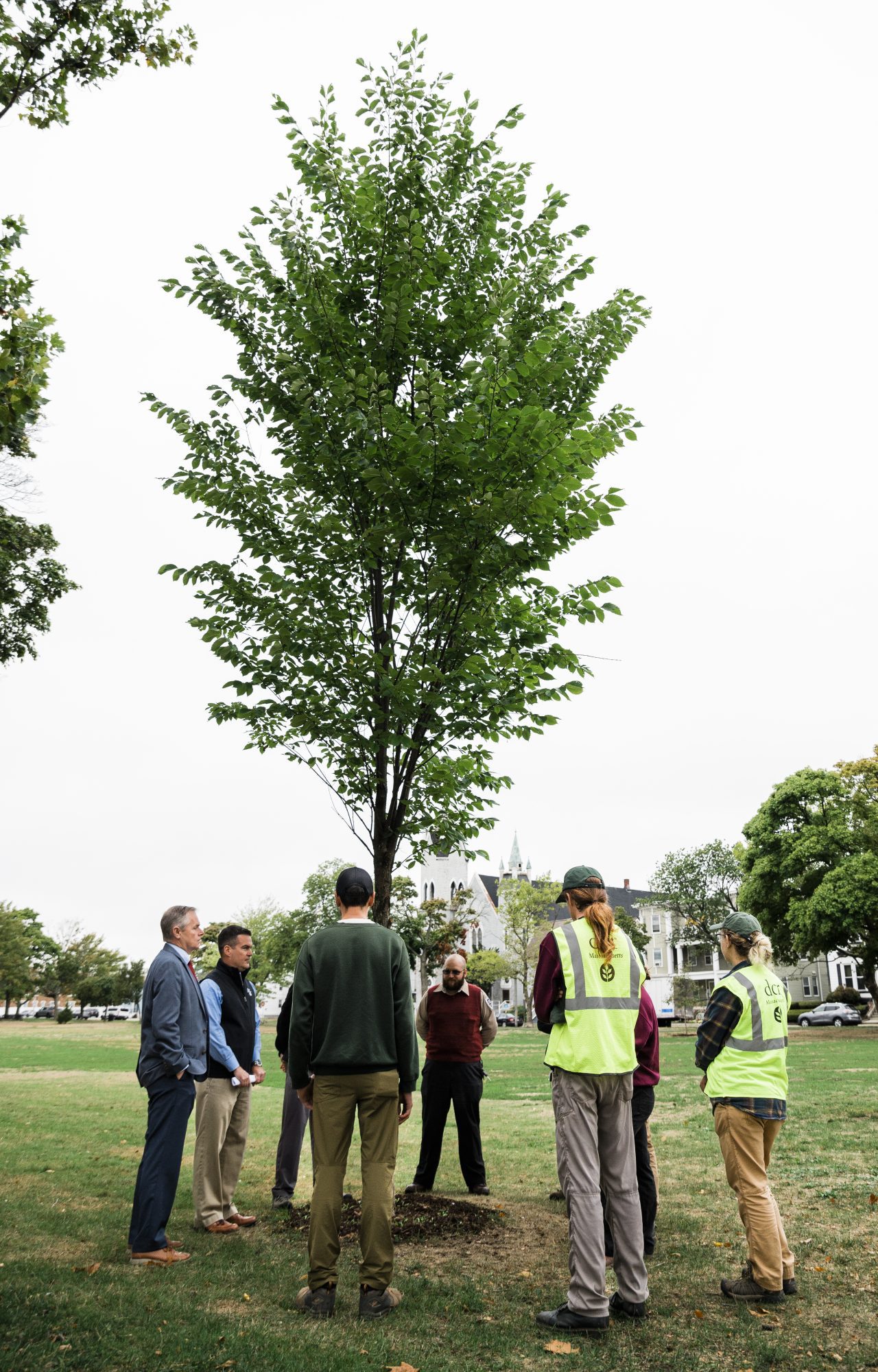LYNN — Officials from the Department of Conservation and Recreation gathered on the Lynn Commons Tuesday morning to discuss their Greening the Gateway Cities program, which focuses on planting trees in smaller urban areas for environmental health and energy.
As Urban and Community Forestry Commissioner Julie Coop, Commissioner Doug Rice, and Energy and Environmental Affairs Undersecretary Gary Moran spoke, they stood around an American Elm Hybrid tree, one of the 2,000 trees the program has planted in Lynn since its inception in 2014.
“In Lynn, specifically, we started planting in 2017. We’re here today because the tree behind us is the 10,000th tree that we planted in the program overall. But in Lynn alone, we’ve planted over 2,000 trees, and 864 of those are on public land and 1,143 are on private land. We have plans to plant an additional 400 trees here in Lynn in the near future,” Rice said.
Rice said that since the program’s creation eight years ago, it has used around $23 million to plant nearly 35,000 trees in gateway cities. He said that although most of the trees planted are small, they provide a significant improvement to the region’s air quality.
“We love trees at DCR. We always sing about all the positive things that they can bring into a community. A single tree can provide a day’s worth of oxygen for a family of four. The trees we plant seem small at first, but in a 40 year lifespan, they eliminate a ton of carbon from the environment. Over the lifespan and one of the trees we plant that’s like erasing 11,000 miles of car emissions,” he said.
Part of the Greening the Gateway Cities Program, Coop said, was an initiative in which local tree planting teams went door to door asking residents if they would like trees planted in their yards. If a resident selects a tree, program members will order one from a nursery, and plant it in the individual’s yard.
“We have a dedicated team of urban foresters. We have an area we’re targeting to plant trees. It’s about 1000 acres. It’s an environmental justice neighborhood and neighborhood with low tree canopy cover,” Coop said. “We’re planting trees to reduce energy costs to the buildings.”
Moran said that by planting trees in a developing city like Lynn, DCR is providing the community with a necessary, natural, and cost-effective form of stormwater drainage.
“Development requires the proponents to adequately deal with stormwater, and trees and the plantings are natural ways to deal with it. Actually, it can save them money in terms of what they need to do to address stormwater while providing all the other benefits of tree canopy,” Moran said. “We’re just excited to be here and celebrating climate week and highlighting all the good work that the administration is putting into the environment.”
In a written statement, Lynn’s congressional delegation, Sen. Brendan Crighton, Rep. Peter Capano, and Rep. Daniel Cahill praised the program for its work on environmental justice and public health.
“More trees and improved greenery lead to many public health, environmental, and social benefits,” Crighton said. “Thank you to our state and local partners for putting environmental justice at the forefront and making the Greening the Gateway Cities Program an ongoing success.”
Capano said the program is part of a larger public initiative to combat the adverse effects of climate change in smaller cities. He said that planting trees in the city will help combat air pollution, rising temperatures, and high energy costs.
“The Greening the Gateway Cities Program is an important piece of a larger puzzle that aims to address the effects of climate change in our gateway cities,” Capano said. “Expanding the urban tree canopy will allow residents to enjoy shaded and cooler green spaces, cleaner air to breath, and a reduction in energy costs.”
Cahill echoed his colleagues’ words, writing that the program provides the community with much-needed help combating climate change.
“It is as important as ever to take steps to combat climate change and protect our environment,”
Cahill said. “The Greening the Gateway Cities Program furthers this mission and provides many benefits to the Commonwealth.”
Anthony Cammalleri can be reached at [email protected]

